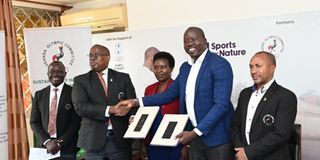Prime
UOC champion conservation in Paris, at home

Sports for nature. L-R: UOC's Kenneth Opedun, chairman Donald Rukare, NFA's PRO Juliet Mubi, IUCN country representative Moses Egaru and UOC's Richard Mcbond Asiimwe after signing an MoU among the bodies to champion the fight against climate change. PHOTO/MAKHTUM MUZIRANSA
What you need to know:
The organisers of the Games had, however, prioritised an eco-friendly event with the athletes’ village (over 7,000 rooms), among other facilities being fitted with geothermal heating and cooling systems to reduce the need for air conditioning. The beds are also made from recycled material.
The weather in Paris is expected to be hot throughout the Olympic Games. It is said that temperatures could run from anywhere between 30-40 degrees.
The organisers of the Games had, however, prioritised an eco-friendly event with the athletes’ village (over 7,000 rooms), among other facilities being fitted with geothermal heating and cooling systems to reduce the need for air conditioning. The beds are also made from recycled material.
However, countries like Great Britain and Australia insisted on installing air conditioners more than a year ago for performance reasons.
Matt Carroll, the chief executive of the Australian Olympic Committee, told UK-based paper The Telegraph that “we appreciate the concept of not having air conditioning due to the carbon footprint, but this is a high-performance Games, we’re not going for a picnic."
Countries like Uganda are definitely not as monied as the GB and Australia but will play their role in reducing the carbon footprint both at home and at the Games.
“For us, it is the seemingly small things that matter. “We have reduced our delegation to the Games. We have reduced our use of plastic and paper by giving our athletes things like water bottles,” Uganda Olympic Committee chairman Donald Rukare, said as he highlighted the need for sportsmen and women to join the fight to reduce carbon waste and climate change.
Rukare was speaking in Lugogo last week, where UOC launched a “Race to Zero” campaign championing the same. They also became signatories to two declarations; The International Union for Conservation of Nature (IUCN) Sports for Nature Framework and the United Nations Framework Convention on Climate Change (UNFCCC) Sports for Climate Action.
The UOC, through their Sustainability Through Sports Commission headed by archery president Richard McBond Asiimwe and equestrian’s Kenneth Opedun, will plant indigenous trees on over 400 hectares of land provided by National Forestry Authority (NFA) in the next four to five years.
“Sport has a wide reach and we want it to share a message about conservation. We have provided land in Kabale, Mt. Moroto, Kyenjojo and Mbale for them to plant, maintain and grow trees to maturity,” NFA’s public relations officer Juliet Mubi, said.
Mubi added that part of Uganda's Vision 2040 is to restore its green land cover to 24 percent as was the case in 1990 and they cannot do it alone. They are at 13 percent currently.
IUCN’s country representative Moses Egaru added that they “are happy to partner and deliver transformative actions through sports. The environment keeps changing and athletes need a good environment.”
Numbers
25,000 - Athletes expected in Paris for Olympics and Paralympics
7,000 - Rooms for the Games
400 - Hectares of land provided by NFA for UOC to plant trees
40 - Temperatures expected to oscillate between 30 to 40 degrees Celsius in Paris
33 - Member federations at UOC
25 - Number of Ugandan athletes at the Olympics




